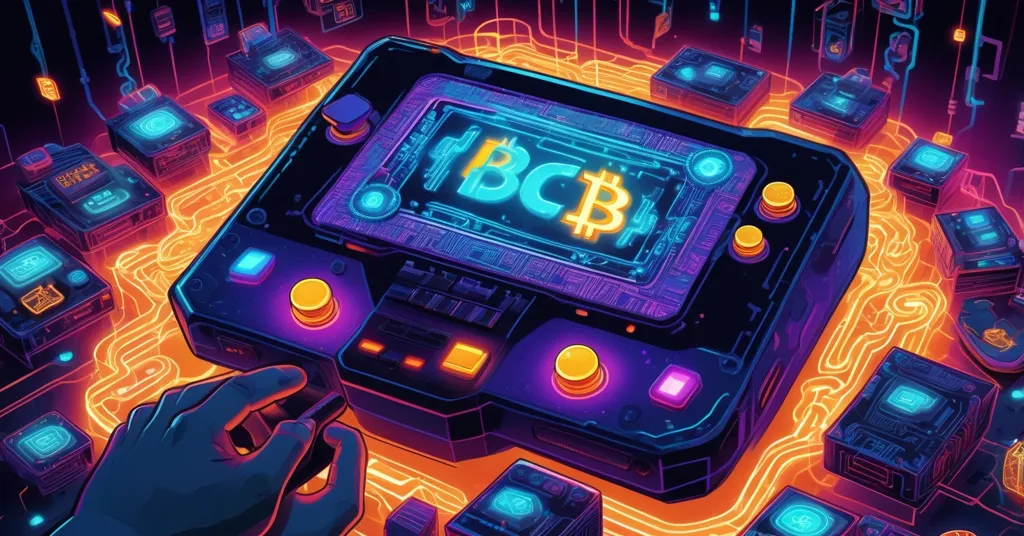Nintendo Switch 2 Smashes Sales Records: Can Bitcoin and Blockchain Transform Gaming?

Nintendo Switch 2 Shatters Sales Records: Can Bitcoin and Blockchain Redefine Gaming?
Nintendo’s latest console, the Switch 2, has obliterated expectations by becoming the fastest-selling gaming hardware in U.S. history, with a staggering 1.6 million units sold in June 2025. As gamers rush to snag this next-gen device, we’re unpacking the numbers, the economic hurdles, and a wild-card question: could Bitcoin and blockchain tech disrupt the way we buy and engage with gaming hardware?
- Record-Breaking Launch: Switch 2 sold 1.6 million units in June 2025, surpassing PlayStation 4’s 1.1 million from 2013.
- Price Pressures: At $449.99, looming tariffs could push costs to $550, testing consumer limits.
- Decentralized Potential: Bitcoin payments and blockchain asset ownership might offer gamers new freedoms—if the tech and trust catch up.
A Historic Launch for Nintendo Switch 2
On June 5, 2025, Nintendo dropped the Switch 2, and within a month, it had already rewritten the record books. According to Circana data shared by Executive Director Mat Piscatella, over 1 million of those 1.6 million units moved in North America alone, contributing to a jaw-dropping $978 million in U.S. hardware spending for June—a 249% leap from the previous year and a new high for the month. Total gaming expenditure hit $4.4 billion, signaling an unquenchable thirst for cutting-edge tech. What’s driving this frenzy? The Switch 2 boasts souped-up storage, crisper video output, higher frame rates, and a bigger screen compared to the original Switch ($300) and the Switch OLED ($350). It’s a tech junkie’s dream—until you see the $449.99 price tag, the priciest launch in Nintendo’s console history, as detailed in the report on Nintendo Switch setting sales records.
But it’s not just raw sales numbers painting this picture of dominance. Four of the top 20 best-selling games in June 2025 have native Switch 2 ports, with Mario Kart World snagging third place even without counting digital or bundle sales. The Switch 2 Pro Controller also topped accessory dollar sales, showing gamers are all-in on the ecosystem. Nintendo’s doubling down with a new bundle featuring Pokémon Legends: Z-A, priced at $499.99 (standalone preorders at $69.99 through retailers like Target and Amazon), a clear play to keep the hype train rolling. Supply shortages are still a headache, though restocks are reportedly getting more frequent and lasting longer, according to the June 2025 sales analysis by Circana. Still, getting your hands on one might feel like winning a lottery, especially with bigger economic forces lurking.
Tariff Troubles: A Price Hike on the Horizon
Enter the not-so-fun part: Trump’s tariffs, set to kick in after August 1, 2025, following a 90-day pause for manufacturing hubs like Japan and Vietnam. These trade taxes are already jacking up costs across the gaming board—Microsoft bumped the Xbox Series S from $299.99 to $379.99 and the Series X from $499.99 to $599.99 as a direct result. For the Switch 2, analysts are sounding the alarm. Michael Pachter of Wedbush Securities predicts a $75-$100 hike, pushing the console to $525 or even $550. Piers Harding-Rolls from Ampere Analysis agrees on the $50-$100 range but suggests Nintendo might eat some of the cost to protect U.S. market share, banking on digital game sales to balance the books. David Cole of DFC Intelligence thinks the current $450 might already have a buffer, capping any increase at 20% (around $540). Nintendo of America President Doug Bowser insists no tariff costs are baked in yet, but let’s be real—when has a corporation not passed the buck to consumers eventually? More on this can be found in the analysis of tariff impacts on gaming hardware.
“Day 1 buyers are going to be the least price sensitive. They still would have bought if the Switch 2 launched at an even higher price.” – Mat Piscatella, Circana Executive Director
Piscatella nails it. Early adopters—those diehard fans camping out for launch day—will pay whatever. But he’s got a sharper warning for what’s ahead.
“The real test will be during the holiday, when more mass market/gift buyers will be considering a purchase.” – Mat Piscatella, Circana Executive Director
Holiday season is make-or-break time. Casual gamers and parents hunting for gifts aren’t going to fork over $550 without flinching, especially if tariffs hit hard. Nintendo’s got momentum now, but a price spike could turn that hype into grumbling faster than you can say “Game Over.” This economic squeeze isn’t just a gaming problem—it’s a glaring reminder of centralized financial systems screwing over consumers with arbitrary cost jumps. Community discussions, like those on tariff impacts for Switch 2 pricing, highlight the growing concern among fans. Which brings us to the wild idea we’re here to chew on: could decentralized tech like Bitcoin and blockchain offer a way out?
Bitcoin Payments: A Cheat Code for Gamers?
Picture this: you’re eyeing a Switch 2, but the $449.99 sticker (or worse, $550 post-tariffs) stings. What if you could pay with Bitcoin or a stablecoin instead, sidestepping fiat currency fluctuations or regional price gouging tied to trade wars? For tech-savvy gamers, crypto could be a middle finger to traditional finance, especially when centralized policies like tariffs inflate costs. Retailers like Target or Amazon might even jump on board to attract a younger, crypto-curious crowd—heck, companies like Overstock and Newegg have accepted Bitcoin for years, so it’s not pure fantasy, as explored in discussions on Bitcoin payments for gaming hardware.
But let’s not get carried away with the HODL hype. Bitcoin payments aren’t ready for prime time in mainstream retail, let alone gaming hardware. Transaction speeds on Bitcoin’s main chain are sluggish for point-of-sale purchases, and while the Lightning Network—a secondary layer designed for faster, cheaper transactions—helps, it’s still not user-friendly for the average Mario fan. Then there’s volatility; imagine paying 0.007 BTC for a Switch 2 one day, only to see that worth $600 the next due to a price pump. Regulatory gray areas add another mess—governments worldwide are still figuring out how to handle crypto, and Nintendo’s not about to risk legal headaches without clear rules. As much as we champion Bitcoin’s borderless, decentralized ethos (and yeah, I’ll admit a maximalist lean here for its unmatched network security), convincing a corporate giant to accept it is like teaching Bowser to code. Possible? Maybe. Likely? Not a chance anytime soon, as outlined in this overview of Bitcoin challenges in gaming.
Still, the tariff chaos underscores a raw truth: centralized systems can shaft consumers overnight. Bitcoin’s potential to hedge against currency risks or let gamers in tariff-hit regions snag a better deal via borderless payments is tantalizing. Even manufacturers like Nintendo could, in theory, settle supply chain costs in BTC to dodge exchange rate nonsense. It’s sci-fi for now—volatility and legal roadblocks keep this a distant dream—but it’s the kind of disruptive thinking we’re all about. If nothing else, the $4.4 billion gaming spend in June 2025 screams opportunity for decentralized economies to step in, assuming the tech matures.
Blockchain in Gaming: True Ownership or Hype Trap?
Beyond payments, let’s talk blockchain’s sexier pitch for gaming: true digital ownership. Imagine owning exclusive Switch 2 assets—say, a limited-edition Pokémon Legends: Z-A skin or a digital bundle—as Non-Fungible Tokens (NFTs), unique digital items stored on a blockchain proving you’re the sole owner. You could trade or sell them securely, maybe even use them across different games or platforms if standardized (think Ethereum’s ERC-1155 token standard, a framework for creating versatile digital assets). This isn’t just geek speak; it ties directly to our love for decentralization, giving gamers real control over their digital stuff without middlemen like Nintendo locking it down, a concept further explored in blockchain ownership models for gaming.
But hold the applause—blockchain gaming is a damn minefield. Look at Axie Infinity, a play-to-earn game that crashed hard when its tokenomics (the economic model behind earning and spending in-game tokens) proved unsustainable, wiping out players’ earnings. Or Pixelmon, a $70 million NFT flop that delivered laughable graphics after hyping a Pokémon-style metaverse. These disasters show why any blockchain move by Nintendo would need ironclad smart contracts—pre-coded rules on the blockchain ensuring trust, like those from OpenZeppelin libraries—to avoid screwing over users. And let’s be blunt: Nintendo diving into NFTs? That’s as likely as Mario swapping coins for Dogecoin. Gamers already torched Ubisoft for dabbling in blockchain with Ghost Recon, and the PR fallout from NFT scams makes mainstream adoption a nonstarter for now, though some insights can be gained from this guide on blockchain gaming integration.
Counterpoint, though—there are glimmers of success. Projects like The Sandbox and Decentraland have built functional decentralized gaming spaces, albeit with flaws. Trading Card Games like Gods Unchained prove blockchain can work when focused on player value over hype. If Nintendo ever explores this, they’d need to prioritize utility—say, NFTs that unlock real perks on the Switch 2—while dodging speculative bubbles. Oh, and let’s not forget privacy, a core value we push. Crypto payments or blockchain ownership could let gamers avoid handing over personal data to payment processors or publishers, keeping Big Brother at bay. It’s a long shot, but in a world where tariffs and corporate greed jack up costs, decentralization feels like a middle finger to the status quo.
The Road Ahead: Gaming Meets Disruption
The Nintendo Switch 2’s launch isn’t just a gaming milestone; it’s a case study in how economic forces collide with tech innovation. Tariffs expose the fragility of centralized finance, while the console’s $449.99 price (and climbing) begs for alternative solutions. Bitcoin could, in theory, offer a borderless payment lifeline, and blockchain might redefine what owning a game or console means. But we’re not shilling moonshot fantasies here—adoption is a brutal slog. Transaction hurdles, regulatory quicksand, and a gaming industry allergic to decentralized risk mean Nintendo’s more likely to churn out another Mario sequel than a BTC checkout option. For a deeper dive into the console’s impact, check out the comprehensive Switch 2 sales data.
Still, as champions of effective accelerationism, we’ve got to ask: could pushing crypto into gaming hardware speed up financial freedom for the masses, or are we sprinting toward a scam-riddled disaster? The holiday season will test the Switch 2’s staying power with price-sensitive buyers, and tariff fallout could sour the party. Meanwhile, the decentralized dream simmers on the sidelines, waiting for tech and trust to level up. One thing’s clear—gaming’s $4.4 billion cash cow is ripe for disruption, if only the right players step into the arena.
Key Takeaways and Burning Questions
- What propelled the Nintendo Switch 2 to break U.S. sales records?
Insane demand, upgraded specs like enhanced storage and frame rates, and killer bundles like Pokémon Legends: Z-A pushed 1.6 million units sold in June 2025, per Circana data. - How are tariffs threatening gaming hardware affordability?
Starting August 1, 2025, tariffs could hike Switch 2 prices by $50-$100 to as much as $550, following Xbox’s lead, potentially alienating budget-conscious gamers. - Could Bitcoin payments solve high console costs for gamers?
Bitcoin might bypass fiat traps and tariff spikes for pricey gear like the Switch 2, but slow transactions, volatility, and legal murkiness keep it a distant option. - What’s blockchain’s potential in gaming hardware ecosystems?
Blockchain could secure digital assets like exclusive console bundles as NFTs, granting true ownership, though past scams demand bulletproof, user-focused designs. - Will holiday sales sustain Switch 2’s momentum amid price hikes?
As Mat Piscatella warns, the holiday season challenges appeal among mass-market buyers, especially if tariffs inflate costs beyond reach. - How does decentralized tech tackle gaming’s economic woes?
Bitcoin and blockchain offer alternative payment and ownership models to counter centralized pressures like trade taxes, but scaling trust and tech remains a steep climb.



